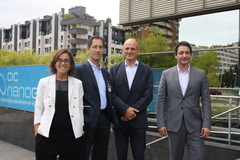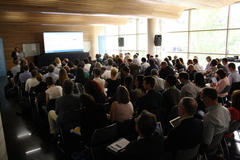ETP Nanomedicine Annual Event 2014
NanoGUNE hosts more than 120 experts in nanotechnology and medicine at the 2014 Annual Event & General Assembly of the European Technology Platform on Nanomedicine (ETPN). The ETPN event has taken place on 15 and 16 October 2014, co-organized by the nanoBasque Agency (SPRI) and nanoGUNE, the Basque Nanoscience Cooperative Research Center.

The future priorities for nanomedical research and innovation have been discussed by the members of the ETPN, based on the ongoing establishment of the Strategic Research and Innovation Agenda (SRIA). The SRIA is of outmost importance for the Platform as it describes the vision of the ETPN for the future developments of nanomedicine and details research priorities that will be proposed to the European Commission, the Member States and their funding agencies for implementation into calls for projects. The strategic document that will be presented in a few months “will reflect unmet clinical/medical needs and integrate in its core the concepts of innovation and translation”, stated Patric Boisseau, chairman of the ETPN. Boisseau explained in a press conference that the goal is to “identify health challenges that can’t be solved with current medicine or where actual treatments are not effective enough, such as, nanovaccines for certain viral infections and therapeutics for neurodegenerative diseases”.
A concrete implementation offer
Nanomedicine is entering a concrete implementation phase for the Translation Hub concept developed by the ETPN in its 2013 White Paper, notably through the latest calls in Horizon2020, and is experiencing an increased interest from the research and industrial communities. In this context, the summit presented in a dedicated session in-depth details on the practical implementation of the ETPN recommendations soon to be launched, for a strong and functioning translational nanomedicine sector in Europe for the benefit of patients.

A unique networking event
The event, as well as the platform itself, aims to be an open-discussion forum for all actors actively involved or interested in the field of nanomedicine to build bridges and enable personal contacts through dedicated networking opportunities and state-of-the-art on-site visits. ETPN chairman Patrick Boisseau underlined the importance of the common work between academic researchers, clinicians and industry in order to define strategic priorities as this is a major key for success.
Of special interest for SMEs has been the launch of the SME Square, an open SME Club to define common training needs, to identify and exchange on specific translation, technology transfer and business opportunities, but also to find SME-suitable solutions to overcome perceived barriers and foster success factors or best practices.
About ETPN ‐ www.etp‐nanomedicine.eu The European Technology Platform Nanomedicine was established in 2005 as a joint venture of the European Commission and CEOs of large industrial companies, SMEs and academic research institutions to investigate and advance joint activities in the area of nanotechnology in medicine. Since 2005 the ETPN published a number of strategic documents outlining the needs and roadmaps for nanomedicine research in Europe. The ETPN contributed to set up numerous European funded projects providing a first impression of economic environment and the structural requirements for an efficient translation of R&D results into innovative nanomedicine. The ETPN supports its members in coordinating their joint research efforts and improving communication amongst the members as well as towards the European Commission and the European Member States.
About nanoBasque Agency (SPRI) ‐ www.nanobasque.eu The nanoBasque Agency (SPRI) is the instrument designed by the Department of Economic Development and Competitiveness of the Basque Government in charge of the deployment of the nanoBasque Strategy, a diversification strategy that aims to accelerate the adoption of micro- and nanotechnologies in Basque companies to increase competitiveness in the leading areas of economic activity and promote the diversification of the Basque industrial fabric.
About CIC nanoGUNE The CIC nanoGUNE Nanoscience Cooperative Research Center, located in Donostia-San Sebastian (Basque Country, Spain), is a research centre set up with the mission to perform word-class nanoscience research for the competitive growth of the Basque Country.
